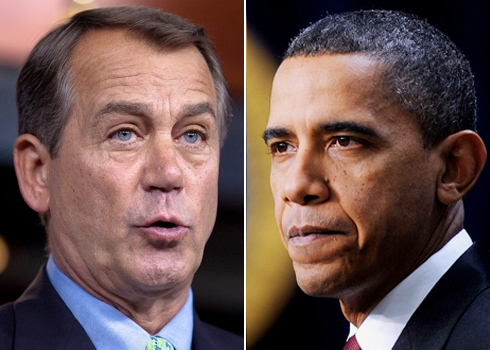A Congressional aide briefed on ongoing negotiations between House Speaker John Boehner and President Obama says the two principals may be nearing a “grand bargain” to raise the debt limit which would contain large, set-in-stone spending cuts but only the possibility of future revenue increases.
“All cuts,” the aide said. “Maybe revenues some time in the future.”
[TPM SLIDESHOW: Debt Ceiling Negotiations At The White House]
The status of negotiations has Democratic aides on both sides of the Capitol nervous and unhappy. And the notion that the impasse over the debt limit may be nearing an end is sparking denials from both the White House and Boehner’s office — in part, perhaps, because neither side has buy-in from their parties on a consensus plan.
A White House spokesman called the claims from aides “not credible” — the result of having a “third-hand version of the facts.”
Later, White House spokesman Dan Pfeiffer tweeted that reports of a $3 trillion deal without revenues were incorrect. “POTUS believes we need a balanced approach that includes revenues,” he wrote. However, what the President believes and what he may ultimately feel compelled to sign off on are not necessarily the same. Equally, Pfeiffer’s tweet would not seem to rule out the idea of “aspirational” revenues that would come at some unspecified time in the future, while coupled with cuts that could begin immediately.
Two aides and a third source close to the principals confirmed that Obama has been emphatic with Democratic negotiators that his preference is to negotiate a big deal with Boehner and squeeze it through Congress.
Lacking still, including among Democratic sources, is any sense of what’s in the still-forming plan — vis a vis both spending and revenue. And Democrats, particularly in the House, will have a lot to say over whether the deal is acceptable — their votes will be necessary for Boehner to pull off a grand bargain.
Earlier Thursday, I asked House Minority Whip Steny Hoyer whether the center of gravity of White House negotiations was on reaching a comprehensive deal on reducing deficits and raising the debt limit, or simply to avert a catastrophic default.
“I think both,” Hoyer told me. “As I said you have a short-term [imperative] and a long-term and we’re discussing both.”
This post has been updated.






